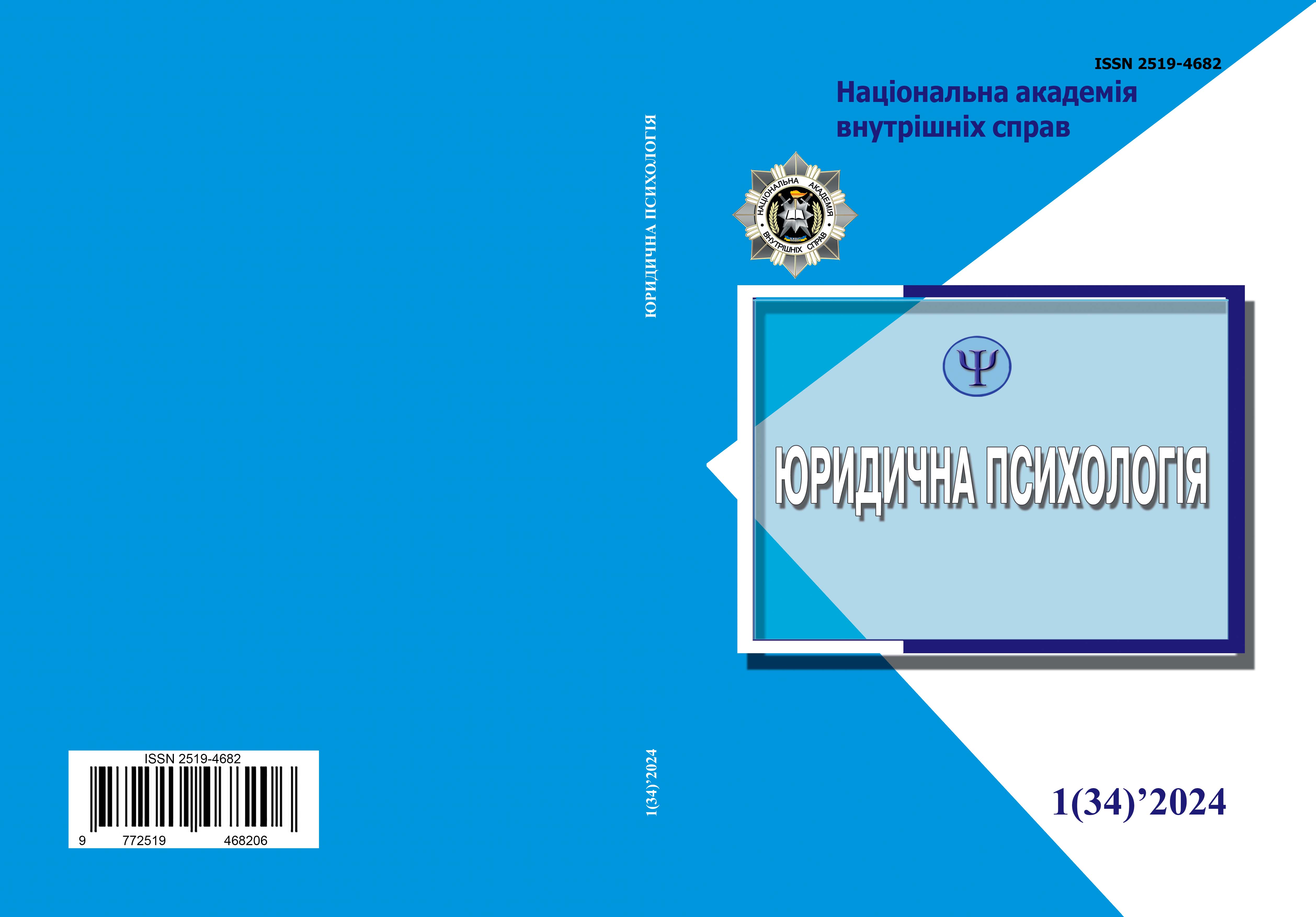Psychological Peculiarities of Interrogation Tactics of Vulnerable Victims in Criminal Proceedings
Abstract
Abstract. The purpose of the article is to highlight the tactical and psychological aspects of interrogation of vulnerable victims. Methodology. The methodological toolkit was chosen in accordance with the defined goal, the specifics of the object and the subject of research. To solve the tasks and achieve the goal, a set of methods and techniques of scientific knowledge were applied, which allowed to comprehensively investigate the object of research. Methods of formal logic (analysis, synthesis, deduction, induction, analogy, abstraction) made it possible to understand the content of the issues in more detail. Special legal methods were used in the research: comparative legal - during the analysis of norms of national legislation, scientific categories, definitions and approaches; the method of system analysis - for a comprehensive generalization of tactical techniques during the interrogation of vulnerable victims. Scientific works of foreign and Ukrainian authors, who directly or indirectly conducted research on issues related to the definition of the concept of "vulnerable victims", as well as forensic recommendations regarding them, were the means of scientific research. The scientific novelty consists in distinguishing the concept of "vulnerable victims" and researching the psychological features of interrogation with their participation. Conclusions. The need to expand the scope of application of the NISHD protocol was noted not only during the interrogation of minors, but also during the implementation of this investigative (search) action with the participation of persons who fall under the category of "vulnerable".
Keywords: criminal proceedings; forensic tactics; criminalistics; tactical reception; interrogation; vulnerable victims; international recommendations.
Downloads
References
Adamska-Gallant, A., Dunal, R., & Kostin, A. (et al.). (2020). Model court. Kyiv: Pravo-Justice. Retrieved from https://www.pravojustice.eu/storage/app/uploads/public/60c/af4/b6a/60caf4b6a936f534182680.pdf.
Antoshchuk, A.O., & Zamula, B.A. (2023). Certain aspects of interrogation of a minor suspect in criminal proceedings. Law and public administration, 1, 173-179. doi: 10.32840/pdu.2023.1.25.
Avramenko, S.M. (20170. Investigation of the corruption of minors (Doctoral dissertation, Kyiv, Ukraine).
Chornous, Y., Reznik, N., Samodin, A., & Nikitina-Dudikova, H. (2020). Techniques of procedural actions performance in green room environment: comparative analysis of European and Ukrainian practices. Int. J. Adv. Sci. Technol., 29(6), 1109-1115. Retrieved from https://www.scopus.com/ record/display.uri?eid=2-s2.0-85083431234&origin=inward&txGid=c0b831425d5dc3df337baf9d4bf5199e.
Haldorsson, L. (2019). Standard 2: Multidisciplinary and Interagency Collaboration: Interagency Agreement Template and guidance. Stockholm.
Husieva, V., Lukash, S., Krykun, V., Morhunov, O., & Shapoval, K. (2021). Conditions conducive to the domestic violence against the elderly based on the judicial and investigative practice of Ukraine. Amazonia Investiga, 10(46), 118-127. doi: 10.34069/AI/2021.46.10.11.
Lamb, M.E., Hershkowitz, I., Orbach, Y., & Esplin, P.W. (2008). Tell me what happened. Chichester: Wiley. doi: 10.1002/9780470773291.
Nadybska, O., Fedotova, H., Shcherbyna, S., Chornous, Yu., & Basysta, I. (2020). Children's rights ombudsman: experience of Ukraine and foreign countries. Journal of Legal, Ethical and Regulatory Issues, 23(2). Retrieved from https://www.abacademies.org/articles/Childrens-rights-ombudsman-experience-of-Ukraine-and-foreign-countries-1544-0044-23-2-476.pdf.
Nikitina-Dudikova, H.Yu. (2022). Forensic methods of investigation of criminal offenses against sexual freedom and sexual integrity of children. Vinnytsia: Tvory.
Novozhylov, V.S. (2021). Prevention of secondary victimization as a task of criminal proceedings. The issue of fighting crime, 41, 165-181.
Orbach, Y., & Pipe, M.-E. (2011). Investigating Substantive Issues. Children's Testimony: A Handbook of Psychological Research and Forensic Practice. M.E. Lamb, D.J. La Rooy, L.C. Malloy, & C.Katz (Eds.). Chichester: Wiley.
Pasko, O.M., Prudka, L.M., Matienko, T.V., & Horoshko, V.V. (2022). Professional and psychological training of pre-trial investigation personnel. Odesa: Helvetyka. Retrieved from http://dspace.oduvs.edu.ua/handle/123456789/5118.
Reporting on registered criminal offenses and the results of their pretrial investigation. Site "Office of the Prosecutor General". Retrieved from https://gp.gov.ua/ua/posts/pro-zareyestrovani-kriminalni-pravoporushennya-ta-rezultati-yih-dosudovogo-rozsliduvannya-2.
Tsymbal, P., Vlasova, G., Nikitina-Dudikova, H., Kharchenko, N., & Soroka, I. (2021). International cooperation in the investigation of sexual crimes against children. Amazonia Investiga, 10(40), 132-141. doi: 10.34069/AI/2021.40.04.14.
Udalova, L.D. (2007). Theoretical foundations of verbal information in the criminal process of Ukraine (Doctoral dissertation, Kyiv, Ukraine).
Urakov, D.R. (2023). Prevention of Crimes Against the Sexual Inviolability of Minors Through the use of the Internet. World Bulletin of Management and Law, 18, 61-64. Retrieved from https://www.scholarexpress.net/index.php/wbml/article/view/1951.
Veselskyi, V.K. (1999). Modern problems of interrogation (procedural, organizational and tactical aspects). Kyiv: Pravnyk; NAVSU.
Abstract views: 30 PDF Downloads: 54
- Authors reserve the right to authorship of their own work and transfer to the magazine the right of the first publication of this work under the terms of the Creative Commons Attribution License, which allows other persons to freely distribute published work with mandatory reference to authors of the original work and the first publication of an article in this magazine.
- Authors have the right to enter into separate additional agreements on non-exclusive dissemination of the work in the form in which it was published in the journal (for example, to post an article in the institution's repository or to publish as part of a monograph), provided that the link to the first publication of the work in this journal is maintained.
- The journal's policy allows and encourages the posting of articles by authors on the Internet (for example, in electronic storehouses of institutions or on personal websites), both before the submission of this manuscript to the editorial office and during its editorial processing, as this contributes to the creation of a productive scientific discussion and positively affects the efficiency and dynamics of citing the published work.




